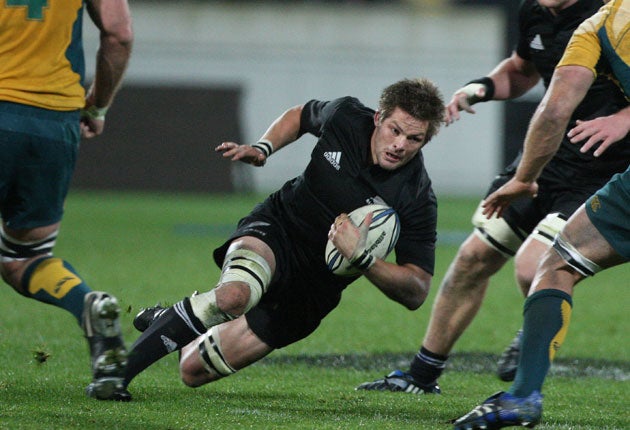McCaw delighted by dominant pack
New Zealand 33 Australia 6

Your support helps us to tell the story
From reproductive rights to climate change to Big Tech, The Independent is on the ground when the story is developing. Whether it's investigating the financials of Elon Musk's pro-Trump PAC or producing our latest documentary, 'The A Word', which shines a light on the American women fighting for reproductive rights, we know how important it is to parse out the facts from the messaging.
At such a critical moment in US history, we need reporters on the ground. Your donation allows us to keep sending journalists to speak to both sides of the story.
The Independent is trusted by Americans across the entire political spectrum. And unlike many other quality news outlets, we choose not to lock Americans out of our reporting and analysis with paywalls. We believe quality journalism should be available to everyone, paid for by those who can afford it.
Your support makes all the difference.As Richie McCaw said, rugby is a pretty simple game when possession is retained and sustained pressure, shorn of mistakes, is applied to the opposition. Few sides can hope to survive so exhaustive a period of international rugby without the ball.
The All Blacks ended the 2009 Tri-Nations with a thumping win over their oldest and nearest foes. Such therapy is always beneficial for the patient and for sure, McCaw’s New Zealand side has been a sick soul this year. But as captain, McCaw understood the value of taking something at the last from so disappointing a tournament.
“I was pretty proud of the guys coming off a loss, very, very happy to put together that performance” he said. “It wasn’t the statistics but the attitude of the team......that impressed. We put pressure on them, that’s what rugby is all about, it’s pretty simple. It was vital to get our game going and we managed to do that.”
But what the All Blacks also had to cheer was the manner of their victory. After defeat by South Africa the previous week in Hamilton, a lot of thought and soul searching had gone into the New Zealand approach. The often aimless kicking downfield was abandoned in favour of a hard running, ball in hand philosophy, from a powerful forward base.
What that meant was that the Aussies got a thumping, the New Zealanders got back some of their lost self belief and the spectators got a feast of attacking, inventive rugby.
It was a game from the old era, when kicking was judicious, not metronomic. By their approach, by the power and efficacy of their work cleaning out at the breakdowns and tidy, industrious play at the set pieces, New Zealand reminded us that rugby can still be a superb spectacle when played properly, with eyes and minds open to opportunities, not pre-programmed to a coach’s mantra.
Old All Blacks of a different era such as Colin Meads and Brian Lochore looked on approvingly at Wellington’s Westpac stadium.
Alas, it is doubtful whether many Australians enjoyed the show. After a promising first season under Robbie Deans’ tutelage, they have gone backwards this year. Deans must be concerned, not just at five defeats in six Tri-Nations Test matches, but the erratic nature of his players’ performances. Combative, as fired up as a Harley at full speed, they smashed the South Africans in Brisbane 14 days earlier.
Yet here, they never even established a foothold in the game, never began to go through the gears. The conquerors of the Springboks became the conquered with barely a splutter. Deans’ teams do not submit in that way.
“We didn’t have too much possession in the whole game” said their captain, George Smith. “Full credit to the All Blacks, they played well throughout and it was very hard for us to get momentum going forward.”
It was, but the Wallabies never even made a fight of it. Their tactics were completely exposed at the breakdown, where New Zealand always had superior numbers, but there appeared a strange inertia about the Australians. The fact is, this was about the best they had, in playing terms. Thus, the ambition of the Australian Rugby Union (ARU) to put a fifth side into future Super rugby competitions was revealed as ludicrous.
New Zealand sought space in which to attack all over the field, including their own 22. A shrewd chip ahead by Mils Muliaina created Corey Jane’s opening try on the half hour and Dan Carter’s goal kicking gave his team a 16-6 half time advantage.
The Australians were finished off in the second half long before Ma’a Nonu, with typical power, and Joe Rokocoko, added tries in the final five minutes. What did for the Wallabies was the All Blacks’ stranglehold up front. Not for a moment did the Australians threaten to break that.
Scorers:
New Zealand: Tries: Jane, Nonu, Rokocoko. Cons: Carter (3) Pen. Gls: Carter (4)
Australia: Pen. Goal: Giteau Drop Goal: Barnes.
NEW ZEALAND:
M. Muliaina; C. Jane (sub. H. Gear 59mins), I. Toeava, M.Nonu, J. Rokocoko; D. Carter, J. Cowan (sub. B. Leonard 69 mins); A. Woodcock, A.Hore (sub. A.de Malmanche 78 mins), N. Tialata (sub. J. Afoa 47 mins), B. Thorn, T. Donnelly (sub. J. Eaton 65 mins), A. Thomson (sub. R. So’oialo 73 mins), R. McCaw (Capt.), K. Read.
AUSTRALIA:
J. O'Connor; L. Turner, A. Ashley-Cooper, B. Barnes, D. Mitchell; M. Giteau, W. Genia (sub. L. Burgess 76 mins); B. Robinson (sub. P. Cowan 67 mins), T. Polota-Nau ( sub. S. Moore 49 mins), B. Alexander, J. Horwill, M. Chisholm, R. Elsom (sub. (blood) W. Palu 62-68 mins), D. Pocock, G. Smith (Capt.) (sub. W. Palu 68 mins).
Referee: C. Joubert (South Africa)
Join our commenting forum
Join thought-provoking conversations, follow other Independent readers and see their replies
Comments